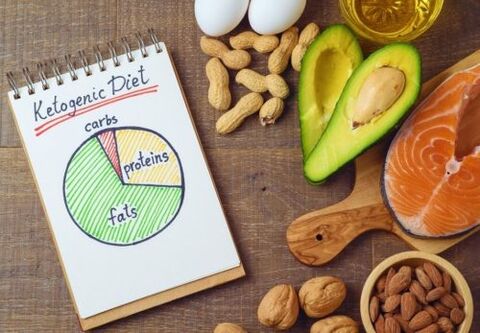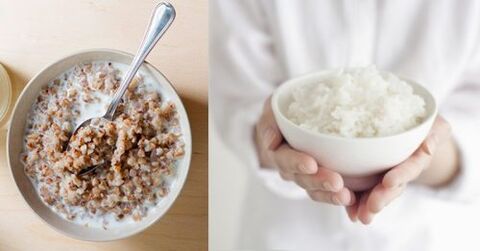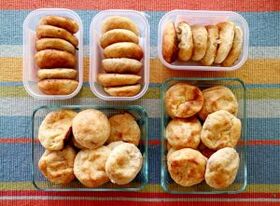The ketogenic diet is a low-carbohydrate diet in which the body uses ketones for energy. These substances are formed during the breakdown of adipose tissue. This diet allows you to lose several kilograms in a month.

About ketosis
The body can go into ketosis when there is a lack of glucose. In some regions, carbohydrate foods are seasonal, so energy comes only from fatty foods. The ketogenic diet is effective in terms of weight loss, but it is necessary to know the principles of its action so as not to harm the body.
The essence of the diet
The main objective of the method is to change the metabolism. The body changes from glycolysis to lipolysis. This requires a minimum of 2-3 weeks. There will not be much fat loss in the first 7 days as the remaining glucose will be depleted. The restructuring of the body occurs in 4 stages:
- Lasts 12 hours after the last carbohydrate intake. During this time, all the glucose will be used up.
- Lasts from 12 to 48 hours. Glycogen, which is found in muscles and liver, is consumed.
- Metabolic changes begin. The body gets energy from protein and fatty acids.
- The final stage begins on the seventh day. The body rebuilds itself on a ketogenic regimen, giving up protein energy.
You cannot completely exclude carbohydrates from the menu, as such a regimen is life threatening.
Advantages and disadvantages
Initially, this form of nutrition was used to treat children with epilepsy. It turned out that with such a diet, external changes also occur. The menu does not use the principle of alternating products. Substances must enter the body in the following proportion:
- fats - 75%;
- proteins - 20%;
- carbohydrates - 5%.
Positive results of using the diet:
- Weight loss due to the consumption of body fat, while the muscle mass does not decrease.
- A balanced menu does not cause hunger, so you can lose weight without discomfort.
- The ketone diet is beneficial for cancer, epilepsy, depression, and Alzheimer's disease.
- Lower blood sugar levels.
- Normalization of blood pressure and cholesterol levels.
- Improves skin condition by clearing acne.
Despite the obvious advantages, you should consult a specialist before using this system. Disadvantages include:
- Possible indigestion due to lack of fiber.
- Insufficient intake of vitamins and essential substances in the body due to carbohydrate restriction. It is necessary to additionally take vitamin complexes.
- In the initial stages, a deterioration of well-being is possible: weakness, decreased concentration, decreased performance, since the body does not have enough glucose. If this condition lasts for about 2 weeks, you should see a doctor.
- The need to carry food, as it is difficult to find low-carbohydrate foods in stores.
- There may be an odor of acetone from the mouth, sweat, and urine.
Also, eating this way during training or active strength loads is not recommended. Often after such diets, diseases occur that were not previously diagnosed.
Effect of diet
The effectiveness of such foods increases when several rules are followed:
- Choose a vitamin complex to compensate for the lack of necessary substances.
- Before starting the diet, you need to undergo a medical examination. This diet is suitable for people in excellent health.
- Analyze the list of forbidden foods. If, by refusing, for example, bread, the body will experience stress, then it is better to find another way to lose weight.
- In the first weeks, there will be a restructuring of metabolic processes, therefore, during this period, it is not necessary to increase the physical or mental stress of the body.
- Cooking diet meals takes time, but you should try not to snack on unhealthy foods.
- For the normal functioning of the gastrointestinal tract, it is necessary to include foods containing fiber in the menu.
- Double your water intake.
This weight loss diet affects everyone in different ways and is not suitable for everyone. Weight loss in 1 month ranges from 5 to 10 kg.
This diet is suitable for men who accumulate fat in the abdomen. The caloric content practically does not decrease and weight loss occurs due to a reduction in the amount of carbohydrates consumed.
Reviews of doctors about such nutrition are ambiguous, but all experts agree that before starting to lose weight, it is necessary to undergo an examination in a medical institution, and if severe weakness or dizziness appears, immediately consult a doctor .
Allowed and prohibited products
List of foods that can be consumed:
- Meat: chicken, turkey, pork, beef.
- Sea fish: tuna, salmon, salmon, herring.
- Walnuts.
- Seafood: squid, mussels, crabs, prawns.
- Eggs: quail and chicken.
- Milk with a fat content of up to 1. 5%.
- Fermented dairy products with minimal fat content, no chemical additives.
- Vegetables. The dose for 1 intake is not more than 40-50 g. Lettuce leaves can be eaten in unlimited quantities.
- Fruits: oranges and grapefruits.
Based on this list, various diet menu options are created. The list of foods that are prohibited to use while losing weight:
- sugar;
- honey;
- cereals;
- any baked goods;
- dry fruits;
- pasta;
- low-fat foods (contain carbohydrates);
- starchy vegetables (potatoes, carrots);
- sweet
- sweet fruits (banana, grapes).
It is important to keep track of your calorie intake.
Basic principles
Nutritional principles:
- The number of meals is 5 to 6 times a day, with 3-hour breaks.
- You need to eat in small portions.
- The amount of water you drink per day should be at least 3 liters.
- Smooth entry and exit from the diet.
- The amount of fat consumed should be twice that of protein.
- Fat should make up 60% of the daily diet.
- The amount of carbohydrates should be kept to a minimum.
- Control of sugar and starch intake.
- Moderate physical activity.
The effectiveness of the method comes only with strict adherence to the listed rules.
Diet varieties and their menu
There are several options for the diet menu, so you can choose the most optimal one.
Standard classical constant
This option is the most economical. Its essence lies in the minimum carbohydrate intake. The daily calorie intake is calculated based on the goal:
- If you need to gain muscle mass, 600 kcal is added to the daily intake.
- If you need to reduce weight, then 600 kcal is subtracted from the consumption rate.
Menu of the week:
- Monday: breakfast: scrambled eggs (3 eggs), grated cheese (40 g), coffee; snack - any nut (30 g); lunch: baked chicken breast (170 g), cucumber (1-2 pieces); dinner: baked hake (150 g), salad (150 g).
- Tuesday: breakfast: hard-boiled eggs (2 pcs. ), Cabbage salad, tea or coffee; snack: smoothies (cottage cheese, nuts and yogurt); lunch: fried chicken (200 g), boiled asparagus; dinner: tuna (150 g), salad (cucumber, tomato).
- Wednesday: breakfast: cheesecakes (2 pieces), coffee; snack: yogurt (150 ml), nuts; lunch: baked salmon (150 g); dinner: seafood salad (150 g).
- Thursday: breakfast: scrambled eggs (3 eggs, fried bacon, spinach), tea; snack: cheese balls with yogurt; lunch: roast beef (150 g), cucumber, pasta (1 serving); dinner: salmon with baked tomatoes (150 g).
- Friday: breakfast: scrambled eggs with vegetables, coffee; snack: any green vegetable; lunch: fried pork with stewed vegetables (150 g); dinner: smoked salmon, hard-boiled egg, Chinese cabbage salad.
- Saturday: breakfast: croutons with cheese, tea; snack: walnuts (30 g); lunch: fried salmon with cucumber; dinner: hot salad (vegetables, seafood).
- Sunday: breakfast: cottage cheese with walnuts, tea; snack: toast with tea; lunch: fried pork with tomatoes and bathed in egg yolk; dinner: baked sole with cheese and vegetables.
Directed - directed, power
This method is suitable for women with an active lifestyle. Carbohydrates are allowed before and after exercise. Glucose enhances the effect of physical activity and provides energy for exercise. For 1 kg of weight, it is allowed to consume 1 g of carbohydrates.
Cyclic
The diet involves periodic carbohydrate loading to maintain muscle glycogen levels. This nutritional option is possible no earlier than 2 weeks after the onset of ketosis. For 1 kg of weight, it is allowed to consume 5 to 10 g of carbohydrates, reduce the amount of fat and leave protein products at a high level. Downloading may take 9 to 36 hours. It should start at the minimum mark. Then you can gradually add 2 hours to each time, focusing on the state of the body.
Get off the ketogenic diet

To consolidate the result, you need to gradually introduce new products to the menu. You can eat porridge 1 time a day for 100 to 150 g. For the first time, you need to refuse freshly baked baked goods. It is also not recommended to eat fried and smoked foods, as the body does not benefit from such foods.
Dish recipes
All recipes presented are low in carbohydrates. Egg preparation methods:

- Put the eggs in cold water and cook for 4 minutes (boiled) or 8 minutes (boiled). They can be eaten with mayonnaise.
- Fry the eggs in butter on 1 or 2 sides. Add pepper and salt.
- Add 2 eggs and 2 tablespoons to the melted butter. l. thick cream. Season with salt, pepper and stir. Add the onion and grated cheese. It can be served with fried bacon.
- Stir 3 eggs with 3 tablespoons. l. heavy cream, salt and add spices. Melt the butter and pour into the omelette. When the top hardens, you can add something tasty (grated cheese, bacon, fried mushrooms).
Bread can be replaced with non-carb crusty bread. To cook, you will need the following ingredients (for 8 servings):
- eggs (3 pieces);
- cream cheese (100 g);
- salt (pinch);
- baking powder (½ teaspoon);
- psyllium husk (½ tbsp. l. ).
Cooking technology:
- Separate the whites from the yolks.
- Beat the egg whites and salt until they form a foam.
- Stir the yolks with the cream cheese. For a splendor, you can add baking powder and psyllium husks.
- Gently add the whites to the yolk mixture.
- Place 8 small loaves (or 6 small ones) on a baking sheet and bake at 150 ° C for 25 minutes, until golden brown.
This bread can be used to make sandwiches. Poppy, sesame, and sunflower seeds are added to the batter if desired. A large bar can be used as a base for a muffin - layer with whipped cream and berries.
You can make low carb cheese pancakes. This will require:

- cottage cheese 9% (300 g);
- egg (1 piece);
- salt (pinch);
- coconut flour (1 tbsp. l. );
- almond flour (1 tablespoon).
Recipe:
- Break the egg, add salt and stir. It is better to take a large container, as the dough will be kneaded in it.
- Add the curd and stir.
- If the consistency is watery, add the coconut flour and mix well. In this case, the curd cakes will keep their shape.
- Moisten your hands in water, form balls with the dough and flatten them a little.
- Dip in coconut flour on both sides and place in a preheated pan with melted butter.
- Fry the cheese pancakes for 3-4 minutes on each side over medium heat.
- Serve with sour cream.
While losing weight, you can cook a vegetable stew with chicken. The following ingredients are required:
- boneless chicken breast or thighs (400 g);
- large zucchini (1 piece);
- eggplant (2 pieces);
- Bulgarian pepper (1 piece);
- mayonnaise (1 tbsp. l. ).

Cooking method:
- Finely chop the chicken, add salt, pepper and spices to taste. Remove the meat and leave it in the refrigerator for half an hour.
- Peel the aubergines and zucchini, cut into small cubes.
- Finely chop the pepper.
- Put the chicken in a preheated pan with oil and fry for 10 minutes over high heat until half cooked.
- Add the vegetables to the skillet, season with salt and simmer for another 20 minutes over low heat.
You can use other vegetables and add sour cream or cheese at the end of cooking.
Contraindications and harm.
Diet affects insulin production, which is why it is prohibited for people with diabetes of any kind. Due to the increased load on the digestive and excretory systems, it is contraindicated in diseases of the stomach, intestines, bile ducts, liver and kidneys.
Only a healthy body can rebuild metabolic processes without side effects and then return to normal metabolic patterns. People who have metabolic problems can feel bad.
Pregnant women may experience a slowdown in the growth and development of the fetus, in lactating women there may be a decrease in the quantity of milk or a deterioration in its quality. This diet is contraindicated for children, since they move a lot and need a lot of carbohydrates. Large amounts of protein are not recommended for the elderly. Your weekly protein intake is 100 to 150 g.
Reviews (2)
The reviews of those who have lost weight on this technique are ambiguous. Each organism reacts differently to a lack of carbohydrates.
- First review, female, 36 years old: "The advantage of this diet is that there is no need to drastically reduce caloric intake. The menu contains a lot of fatty foods: fish, meat, nuts, so I feel more comfortable with such a diet than with a balanced ".
- Second checkup, female, 28 years old: "I could not sit on this diet as there was bloating and constipation due to a lack of fiber in the diet. "
- Third tip, 55-year-old woman: "I lost weight with this technology for 3 months. As a result, the weight has decreased by 10 kg. For my age, this is not a bad achievement, as the metabolic reactions are slower. Also from the external effect, I managed to get rid of the food addiction: now I don't eat sweets. The daily menu is designed in such a way that the feeling of hunger is not felt. "


















































































